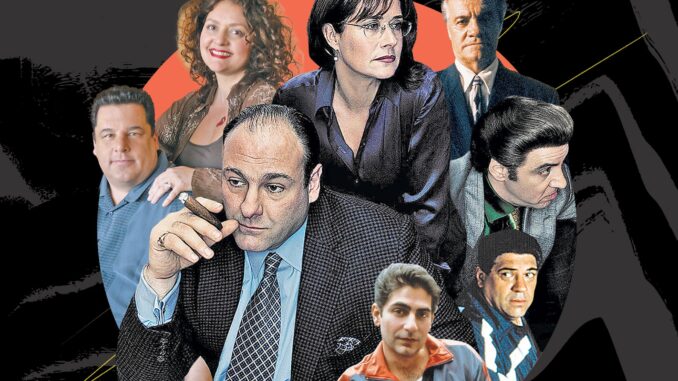
On the set of The Sopranos, nobody takes any notice of the noises. Perhaps when you’re working on the finest TV show around, you have too much else to think about. But perhaps it’s more that, over time, the strangest distractions come to seem normal. Sometimes they are basic helps, bellows, shouts, hollers and roars. Sometimes, loud animal noises. David Chase, The Sopranos’ creator, remembers the first day’s filming on the show’s pilot episode. “I kept hearing these chicken noises,” he says. “And you think, ‘OK, what is this?’ I never said anything.”
All these noises are made by one man, James Gandolfini, and they can usually be heard just before a director shouts, “Action!” and Gandolfini fully slips into the guise that has made him famous, the role of Tony Soprano. “Oh, yeah,” acknowledges Gandolfini when the subject is brought up. He suggests that his habit’s roots might lie in something he once learned in an acting class, about how a sharp noise can release tension. “It’s almost like, you are about to make a fool of yourself, so you might as well make a fool of yourself right away,” he reasons, “and then making a fool of yourself on camera is a little easier.”
When asked whether different animal noises conjure up different moods, he insists otherwise – “No, totally random,” he says – but he does concede that he is still trying to expand his menagerie. “I’ve been trying to do a pig noise for a very long time,” he says, “and I can’t seem to master it.” For him, the gold standard in this field is Gérard Depardieu’s splendid porcine snort in the movie Green Card. “I don’t have anything that would even come close to that,” he says. “Rent the movie, man – it’s worth it just for the pig noise.”
What do you think The Sopranos is really about?
Lorraine Bracco (Dr. Melfi): Family life. Tony Soprano’s wife and children, and how a working guy goes about his business. It’s as simple as that.
Michael Imperioli (Christopher Moltisanti): I’d say it’s about an American man in his middle years who has had a certain degree of success, and his unhappiness with it.
Steven Van Zandt (Silvio Dante): I think it’s about the American dilemma. It’s all about what I call our time-deficit disorder. No one has any time anymore. Everybody has two families: Everybody has work, everybody has a family at home. And we just don’t have time for either one.
Aida Turturro (Janice Soprano): A family and relationships. That’s why so many people – from a lawyer to the guy working at the deli to, you know, a fireman – like the show.
Edie Falco (Carmela Soprano): A suburban family at this time, and the struggles of the patriarch to survive.
Dominic Chianese (Uncle Junior): It’s a family show – it’s about a mother, a son, an uncle, a wife and children, and all the ramifications, and then the guy’s job, which happens to be hustler, con man and a killer. It has nothing to do with gangsters – it’s all about society.
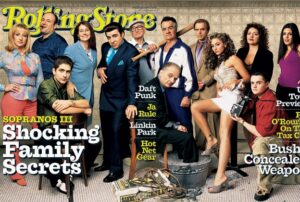
Robert Iler (Anthony Jr.): I think it’s like a mix between a Mafia film like GoodFellas and, like, The Honeymooners or even, like, Married With Children. Like, my grandparents can watch it, and they can appreciate, like, the family and the loving, and the people who are in college can watch it because of, you know, the cursing, the strip club, the hanging out and killing. So it’s kind of like it has everything.
James Gandolfini (Tony Soprano): I heard David Chase say one time that it’s about people who lie to themselves, as we all do. Lying to ourselves on a daily basis and the mess it creates.
David Chase: I can’t say, and I don’t want to say. Because if I think that, then that’s what I’ll start to make it about.
David Chase is fifty-five. He has worked in television for most of his adult life. He says that this has been a mistake and marks a failure of courage on his part. He wanted to make movies. “Frankly, I did a bad thing,” he says. “I took the money. I didn’t have the guts to stop it. . . . I compromised. Hugely.”
His childhood was spent in New Jersey, in the kind of small towns you see in The Sopranos. Both his parents were Italian-American. He was a very fearful child, something he inherited from his mother, and was scared of ambulances, people with bandages on, monsters under the bed and plenty else. Though he’s at pains to point out how much his mother also cared for him, her fearfulness and self-pity were her greatest weapons and exhibited themselves in extraordinary declarations and actions. Once, when he was seven and they were cooped up in side during a snowstorm and he kept going on about wanting a Hammond organ, she threatened to poke out his eye with a fork.
“Oh, poor you,” she’d sometimes say. Or, “I wish the Lord would take me.” Or she’d tell him, “I’d rather see you dead than avoid the draft.” She wouldn’t answer the phone after dark.
Chase’s father, who ran a hardware store, wanted Chase to be a labor negotiator in South America, but Chase had other ideas. He wanted to be a drummer – “Over my dead body – that Gene Krupa was a drug addict,” his mother said – and then, studying English at NYU, he got interested in foreign films: Fellini, Bergman, Antonioni. He loved their mystery: “They didn’t spell everything out for you,” he says. He moved to California to get into movies. (“Those people will grind you up,” his mother told him; her example, this time, was Frank Sinatra.)
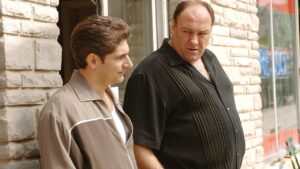
In 1974, Chase got a job writing on Kolchak: The Night Stalker (the series that would inspire Chris Carter to invent The X-Files) and was soon happily working on The Rockford Files. For the next twenty years, he would alternate between writing for and eventually running TV shows (he ran the last two years of Northern Exposure, and also I’ll Fly Away) and developing TV series and film scripts. He created one TV series himself, Almost Grown, in 1988; it ran for only six episodes. He made plenty of money and became increasingly frustrated. At times, he began to hate TV, and he’d think to himself, “If I see one more establishing shot of a skycraper and then they cut into the office and talk for four pages, I’m going to kill myself.” On and off, he would vent these and other frustrations to therapists.
Sometime in the Seventies he had thought of a story idea involving therapy. “About a CIA guy seeing a shrink,” he recalls. “He and his shrink would meet on a bridge over the Potomac River to have their therapy sessions so no one could tape them.” His wife had always told him that he should write a movie about his complicated relationship with his mother, and in 1988 he mentioned that to Robin Green, one of the writers on Almost Grown. The next day, she came in and told him she’d been thinking about it, and that it would make a great movie: “A TV producer and his mother.” But he wasn’t convinced: “I felt it would be too boomerish, too yuppieish – a TV producer complaining about his unhappy childhood.”
A while afterward, he figured out away it might work: Make the guy a gangster, a gangster in therapy. “This mobster who was depressed because his mother was depressed,” he says. (Chase emphasizes that by now this was not about his mother, though the mother would borrow many of the same ways of expressing herself.) He pitched the idea to his agency. “Nah,” was the anser. “Mob comedies, no. Mob movies at all, no. Psychiatry, no.” Now and then, he’d think about this story. “I kept pitching it to myself, saying, ‘Someday I’ll do this,’ “he says. Over the years he would write nine or ten movie scripts that would never become movies, so another unrealized story idea was low on his list of woes.
Encounters with the real-life men and Women who act in The Sopranos: Number One
“Fuck! Oh, My God! Oh, My God!” I am sitting with Drea de Matteo, who plays Christopher’s wide-eyed girlfriend, Adriana, in The Sopranos, in the back room of Filth Mart, the vintage-clothing store she runs with her boyfriend in Manhattan – “We brought back the rock & roll T-shirt,” she says, and points out that Jay-Z refers to their jeans in a recent song – and we are sitting next to a table of pop-culture detritus, including a Scooby Doo game, an Osmonds paperback and various old copies of Penthouse and Forum, and she is just explaining about how she keeps the testicles for merly belonging to the larger of her two Great Danes in a small jar filled with formaldehyde and blue dye on a shelf by her bed next to her vintage editions of Oscar Wilde, Baudelaire and Rimbaud, when she screams.
It is I who should be screaming. Her smaller Great Dane has been running around the room with another dog, and the other dog has just . . .
“He just shit on your fucking pants, man!” de Matteo observes, accurately. “I am so sorry. . . . ” She leads me to the bathroom where she kindly crouches at my feet, mopping, saying over and over again, “I’m so sorry, I’m so sorry. . . . “
And then we carry on.
David Chase didn’t originally plan for de Matteo to be a regular cast member; she appeared in the pilot as the hostess in Vesuvio restaurant, but the part evolved. De Matteo had a fairly wild upbringing in Queens. She tells me about going to film school when she was sixteen, but also about accidentally smoking angel dust when she was twelve and, at around the same age, being in a car some boys stole. It belonged to a local mafioso. They were chased and got away. When we talk about movies, she tells me, “I’ve seen The Exorcist more than eighty-five times. I used to pretend I was her when everybody would be asleep at night, walk around the apartment, piss on the floor. I’d put on whiteface, my hair all fucked up. I’d wait for my brother to come home, tripping on acid.” She laughs. “That’s why I’m in therapy.”
She mentions that she was supposed to be at therapy right now. “I don’t think it’s a secret that everybody in this business has been in therapy their entire fucking lives,” she says. She has regular therapy followed by group therapy, but today she got out early to see me. “Today was a boring day,” she says. “Nothing deep.”

I ask for an example of what they talked about, just making conversation.
She says she wasn’t quite telling the truth about her therapy session. “My best friend just died,” she says. Jamie lived with her, her boyfriend and the Nicaraguan housekeeper who was de Matteo’s de facto mother figure growing up. He OD’d. She has since had the initials of his favorite Rolling Stones songs and a heart with an American flag on it tattooed on her ankle.
She screws up her face in pain. Her leg. “I have arthritis,” she says. “My fucking leg’s a mess.” She says this: “I’m such a shy person, and people think I’m really snotty because I’m shy, but I’m not. I’m just shy. I never had any friends because I was so shy. And they just thought I was a cunt. And I’m not. I’m so nice. I’m just scared.”
It was in the mid-Nineties, when his current agents suggested to Chase that he develop a TV show based on the mob, that he dug up his old idea and started working on a pilot. Fox would eventually pass on it, as would the other three major networks. Then HBO signed on. Around this time, Chase remembers referring to the show as “a real-life Simpsons.” “I guess I was just thinking the attitude and the comedic dysfunction and the vulgarity of The Simpsons,” he says. “I also started thinking about it as Twin Peaks in the Jersey meadowlands.”
The first season’s principal story arc – of the conflict between the depressed mobster and his mother – was the one Chase had mapped out years before, though when it came to it, he realized he didn’t want to kill the mother. She was too good alive. (At the end of the movie, the mobster had gone to kill her, but found her dead of a stroke – her final triumph.) The one significant conflict with HBO was about the show’s title: They thought that The Sopranos would confuse people, that people would expect it to be about opera singers. They insisted that the show be called Family Man.
“One of the few things they’ve ever said that horrified me,” says Chase. “And the cast, they went ape shit.” Long lists of compromise suggestions flew back and forth. Family Guy. Made in New Jersey. The Tony Files. Chase suggested Red Sauce. (“I was getting desperate,” he says.) He likes to think that they would have won the argument on its merits, but their cause was helped when Fox announced that it would be premiering an animated series called Family Guy. HBO’s chosen title was suddenly unusable.
Encounters with the real-life men and women who act in The Sopranos: Number Two
One day, I have lunch with Steven Van Zandt, otherwise known as Little Steven, guitarist for Bruce Springsteen‘s E Street Band. As ever, he wears one of the bandannas he has sported since his hair didn’t grow back properly after a car accident more than twenty years ago. Today’s is purple and complements his purple paisley shirt.
It was David Chase’s wild hunch that Van Zandt could play a New Jersey mobster, a notion spurred by the memory of him on early Springsteen album covers. “In his pre-bandanna days,” says Chase, “he used to wear a little porkpie hat, and he looked like a sharpie, an operator, a connected guy. And there was something about the E Street Band that looked like a crew.” This, says Van Zandt, was not unintentional. “I looked at it at the time as we were sort of the Rat Pack of rock & roll,” he says. “Me in the Dean Martin role. I was sort of the wild man of the group to Bruce’s Frank.”
When he met Chase, Van Zandt told him that he already had a character, Silvio Dante, he had invented years before for a movie treatment about a retired hitman. “It was a plot about the Russian mob moving in on New York mob territory,” he recalls. Van Zandt decided that the key to his new career was to be as different as possible from his real self. He was already twenty pounds overweight, so he put on another thirty or forty pounds for the first season. “I didn’t want to take any chances, man,” he says.
He’s fine company, expressing miserable sentiments with joy and laughter. We discuss the Sopranos sensibility. “You know, you are walking round the corner and waiting to get hit by that bus,” he says. “You know it’s coming sooner or later. I know that sounds pessimistic, but I think it’s a realistic view of just how miserable this planet is. I mean, let’s face it: Life sucks. If you don’t see that, you’re fucking blind. That’s my view, and I think perhaps David shares that sentiment to some extent.”
I leave him to meet Michael Imperioli. He’s a surprisingly quiet man whose first big break came in another gangster landmark, GoodFellas, as Spider, the youngster who Joe Pesci makes dance, shoots in the foot and later kills. He thought he was made, but he spent a few more years after that doing more restaurant work than acting. In The Sopranos, he plays Christopher, an up-and-coming gangster who also writes movie scripts, something that Imperioli – who co-wrote the 1999 Spike Lee movie Summer of Sam and two Sopranos episodes – says was already in the pilot script before he got the part. Sitting here, Imperioli, whose character has been party to many of The Sopranos’ most horrific scenes, lets slip one more thing. “I don’t like violence that much,” he says. “I don’t mind playing it, but I don’t like watching it. Like, A Clockwork Orange I saw once, I could never watch it again. I get incredibly squeamish, believe it or not. . . . “
The most disturbing moment in the first two seasons of The Sopranos is one of latent implied violence rather than of actual violence. It was a love scene between Janice Soprano and her boyfriend, Richie Aprile, played by David Proval. They are having sex on a sofa. Janice is on her knees, facing away from Richie, who is holding a gun to her head. “Oh, Richie baby, you’re the best,” she tells him. (The sex is not successfully consummated, because Janice starts saying, “Oh, you’re the boss,” which only reminds him that in the Soprano mob hierarchy, he is relatively impotent.)
When they have not simply resorted to their imaginations, Chase and the other Sopranos writers have picked up details of possible ways in which these people may live from a variety of sources. Chase had a contact in the Manhattan DA’s office who had prosecuted mob guys. “What they value, what they don’t value, the four reasons people flip, all kinds of interesting stuff,” says Chase. One of the writers, Frankie Renzulli, who grew up in a Boston housing project, also brought in a lot of a specific knowledge. There are a few Mafia-related books on the bookshelf in David Chase’s office, one of which is Mafia Women, by Clare Longrigg. In it, he found this passage: Christina Culicchia, girlfriend of Sicilian hitman Antonino Titone, describes how he used to come home drunk, rip his clothes off and grab her, holding his gun to her head. As he fucked her at gunpoint, he made her say, over and over again, “Ninu is the best, Ninu is the best, Ninu is the best. . . .”
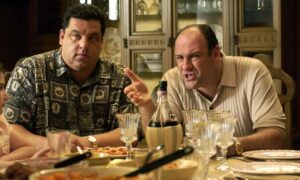
Aida Turturro was not keen: “I’d never had a sex scene before. I was scared shit.” She was also concerned about whether it seemed demeaning to women, though her reaction was less extreme than David Proval’s. “He was very, very upset,” says Chase. “He said his wife had seen the script and thought it was just horrible, what it said about women, the way it was done. I said, ‘You’re not doing it – Richie Aprile’s doing it.’” I also said, ‘We have not done a politically correct show, and I’m not going to start now.’”
Chase says that HBO has imposed no limits on the show. But he sometimes wonders if they go too far – “Did he have to say ‘fuck’ three times in the last thirty seconds?” he will wonder – not because he’s worried about offending people, more that they might lose the sense of freshness and truth. He tells me this: “That’s the problem of television: the curse of the familiar. It’s the repetition. And yet that’s what people like. They want to see Kramer come in like this.” He waves his arms, frantic and asymmetrical. “I don’t. Two times, three times, fine . . . then I don’t care anymore. It depresses me on some level that people crowd around to see the same thing every week.”
Encounters with the real-life men and women who act in The Sopranos: Number Three
I am to meet Tony Sirico, who plays one of Tony Soprano’s aides, Paulie Walnuts, at the Sopranos set. He wants to talk to me between scenes, so we step into the corridor. I ask him a few general introductory questions before he is called back inside. As he goes, he grins and says, in an entirely friendly way, “Give me some more interesting questions about me, you fuck.”
Sirico is unusual among the Sopranos principals in the way he knows the world he is portraying. He has been acting for twenty-eight years, but before that he lived another life. He grew up in Brooklyn, “a rough-and-tumble kid.” Ironically, considering the way his life turned out, he learned much of what he knew about the street from James Cagney movies – “He taught me how to walk and talk.” (The way Paulie Walnuts holds up his hands in front of his stomach is a conscious echo of Cagney’s body language.) But he also noticed the tough guys, the gangsters, in the neighborhood, and he liked what he saw. “They’re all dressed, slicked back, they got cars, they got girls, very enticing,” he says. “In my eyes back then, I only seen the pretty part of it. I didn’t see that the guy was a dangerous killer or stuff like that.” He says that he very nearly became a made Mafia man himself – “I got close to making a huge mistake…. I almost got too close to becoming one of those guys I portray.” A friend wanted to sponsor him, and he refused only because he had always had a problem with authority: “The good thing I had going for me not being involved profoundly with wiseguys was that I don’t like anybody telling me what to do. . . . “
He still got in plenty of trouble on his own. He has a bullet wound in his leg from when a guy caught Sirico kissing a girl who had spurned the shooter. (“At the time,” says Sirico, “all I thought about was, ‘Fucking ruined my white suit.’”) He was arrested twenty-eight times, and sent to jail twice, for a total of seven years. He would stick up places, though perhaps understandably he is reluctant to discuss this.
“Let’s just say I made a few withdrawals,” he says.
In the last twenty-eight years he has been in approximately forty films and fifty TV shows, usually playing tough guys. He says he has been killed seventeen times in movies. “And do I mind being stereotyped?” he asks himself. “Absolutely not. I’ve paid my rent, I take care of me and Ma. “He’s lived with his mother for the past fifteen years and refers to her as “my first love.” The tough guys in Sirico’s neighborhood are still friendly with him. Sometimes they critique him. “You were a little weak in that area,” they might say. “They love me for being in this show,” Sirico says. “I’m still part of their family in their hearts. They know I’m a stand-up kid, whether I’m a tough guy or not.”
For the first two days I’m on the Sopranos set, James Gandolfini does not say hello to me, though one time he catches my eyes across a crowded soundstage and raises his eyes as if to say, “Yeah, I know you’re there.”
In time, he gets friendlier. One morning he walks in and stretches out his hand. “Hello, Satan,” he says to me, in the sweetest of ways. Later that day he turns to Robin Green, who has written the episode they are filming, and confers about what the next scene means and how it should be played. “How about we do it,” he suggests, “and if it really sucks, you let us know?”
In the scene, he is having trouble with one particular line: “And who cares about shit they don’t have balls enough to say to your face?” It keeps coming out mangled. He asks to be read the exact wording. He nods. “It’s shit, balls, face,” he says. Between takes I can hear him repeat this mantra. “Shit, balls, face,” he says. “Shit, balls, face.”
One of the other actors in this scene is Joe Pantoliano, a new cast member this season. They have to embrace at one point. People who enjoy the Sopranos’ mobsters constant on-screen quoting of lines from the Godfather films will be pleased to know that, during one rehearsal, as Gandolfini embraces Pantoliano, he says to him, “It was you, Fredo. You broke my heart.” (I do a survey. The cast member who has watched the Godfather films the most is Tony Sirico: the first about a hundred times, the second maybe fifty. Steven Van Zandt has seen them maybe fifty times: “You try and spread it out so you at least forget a few things.” Michael Imperioli has seen them at least twenty times – his family has a Christmas tradition where they watch the first three hours of the entire saga Christmas Eve, then watch the rest Christmas morning. Robert Iler is the only member of the cast I speak to who has seen the first Godfather film just once.)
Later, Gandolfini invites me into his mobile home, parked outside. There’s an exercise bike and a photo of him with his young son on the counter. He pats his CD player. “That’s my sanity,” he says. He puts on some AC/DC. Sometimes he’ll need Frank Sinatra, sometimes Lynyrd Skynyrd, but it’s AC/DC that is the most useful. “Especially in the morning if I have to be pissed off, I’ll put on a little AC/DC,” he says. “Bang my head against things.”
Encounters with the real-life men and women who act in The Sopranos: Number Four
Jamie-Lynn Sigler, who is nineteen and plays Tony Soprano’s daughter, Meadow, meets me in an empty office at HBO. She tells me about Gandolfini, how he gets on the phone with her boyfriend, checks that he’s treating her right. “He’s actually just like a teddy bear. I think of him as my second father. You can sit down and have the nicest conversation with him, and then he’ll get up and punch walls and beat someone up.”
Sigler, who started dancing when she was two or three and then slipped into acting, is not Italian. She is American-Jewish-Greek-Cuban. “I guess when you put it all together, I look Italian,” she says. Before she got The Sopranos, she was on the verge of giving up acting – she figured she wanted to be a normal kid and spend the summer at sleep-away camp. Instead, she filmed the pilot. There was nearly a year between the pilot and filming the rest of the first season, and that was not a good year for her. She became obsessed with what she ate and how much she exercised. “One thing started to lead to another because I was reading Shape and all those magazines – it was just a big snowball.” She started going to bed at midnight after dance class and homework and then getting back up at four in the morning to exercise for three hours. Her weight plummeted.
When she returned to the set, she was called in by Chase and one of the other producers. They explained that they wanted a healthy, normal girl. When, after she got back to her normal weight for the second season, people began carping on the Internet at how chubby she’d become, she decided to go public with what she’d been through. She contacted the American Anorexia and Bulimia Association, talked on TV shows and wrote about her experience in Seventeen magazine, afterward answering every single letter. She thinks it’s made her stronger. Now she’s planning to become a pop star. Her first single is out soon. “It’s young, it’s fun, it’s happy, it’s dance music,” is what she says.
Robert Iler and I talk in his manager’s office after school. He’s just been in physics class, but as he keeps missing classes to film The Sopranos and never quite catches up with his tutor, he is adrift. “I have no clue what was going on,” he says. “If you miss one day in physics, that’s it.” Soon he’s going to be home-schooled: “Everyone says you should have a normal life and go to school, but I don’t think going to school is normal. It’s insane – sitting in a chair for eight hours listening to people bable on. I can’t take it.”
Iler’s crazy about Slipknot. Everyone’s into them now, he complains, but he liked them fifteen months ago. Iler told David Chase all about Slipknot, and Chase thought it was funny; this season Anthony Jr. is into Slipknot, too. “Music is my life,” says Iler. “I just listen to music on Napster. I have, like, 80,000 songs. Slipknot, Pantera, Metallica . . . ” He also – fully embracing the incongruity that adulthood bashes out of us – utterly adores Jennifer Love Hewitt. He has more than 200 pictures of her on his bedroom wall. “I’ve never seen a woman half as beautiful as Jennifer Love Hewitt.”
Edie Falco, who is half Italian and half Swedish and plays Tony Soprano’s wife, Carmela, meets me for lunch. She grew up on Long Island and spent four years in acting school learning how to lose the kind of accent she uses in The Sopranos.
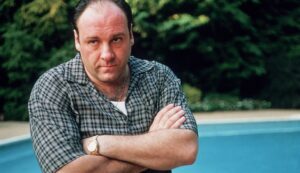
Right now, she is preparing for the Sopranos’ trip to the Golden Globes. (They will win nothing.) She’s not too keen about these ceremonies: “To win an award over the girl from Dark Angel is not where it’s at for me.” She was the first cast member to win a big award – for best lead actress in a dramatic series, at the 1999 Emmys – and even that wasn’t too joyful. “One by one, we didn’t win,” she remembers, “and then I won. It was yucky.” Though her family and her agents would be thrilled, it wasn’t like that for her. All of the Sopranos people had come together on a bus, and everybody else had to wait on the bus for her to do all of her victory interviews, and then she had to climb aboard, carrying her award. “There was nothing fun about it,” she says. “Everybody was angry that we had been treated so seemingly disrespectfully – it was as if we didn’t exist out there – and here I was holding this Emmy. I immediately stuck it in my luggage.”
James Gandolfini waits in the reception area used by patients of Dr. Melfi, Tony Soprano’s psychiatrist. Lorraine Bracco, who plays Melfi, is already sitting in her circular office (“It’s like a womb,” she says), where they will be filming today. Gandolfini walks in and takes the chair across from her. He looks at Bracco and says, “No legs.” This is a complaint. (Later, he will explain to me, “Oh, I love her legs. I love her legs, and I love her cleavage, and I miss them terrible when they’re not there.” When I further ask whether this is James Gandolfini or Tony Soprano talking, he says, “I think it’s both,” then thinks to add, “Tony, mostly.”)
He and Bracco try their scene, in which Melfi is pressing Tony to make some key psychological connections, and then Gandolfini discusses with Steve Buscemi, this episode’s director, what Tony should really be feeling. Gandolfini nods. “OK. Let’s try another one.”
Gandolfini tells me later that he likes these scenes for a number of reasons. Partly because of Bracco: “She’s wonderful and she’s funny and she’s receptive to my weirdness and I’m receptive to her weirdness.” Partly because he thinks they’re good for the show. “I find them to be the Greek Chorus of the character,” he argues. There’s another reason. “Sometimes,” he says, “they explain to me what’s going on with the character.” And some of that even leaks back into his own life. “I have learned a hell of a lot from this show,” he says, “just from the sessions with Dr. Melfi alone, about human beings. David Chase has taught me a great deal about depression and about anger and about things that I never knew about. And you come home, and you think about them. . . . “
When Bracco’s lines are being filmed and Gandolfini is off-camera, he has a repertoire of ways to distract her and enliven the day. Sometimes he’ll do something he calls his hula dance. “It’s like the Chippendales version of Tony Soprano,” she says. “It’s like a sex dance, you know. . . . There’s thrusting, there’s hip movement, there’s tongue-wagging.” He has also mooned her. “Nobody knows what I go through,” she says.
In some respects, David Chase likes to compare The Sopranos to the Mir space station: It simply wasn’t designed to keep working so long. “We had no idea this show would appeal to people,” he says. Consequently, the start of the second season was difficult. “Because the show quite unexpectedly made such a splash that it screwed us all up,” he says. And they had created some structural problems for themselves. How could Tony Soprano have anything to do with his mother – their shared scenes had been central to the first season – after she had tried to have him killed? How could he have scenes with Uncle Junior, who was now his enemy? How could he have scenes with his psychiatrist, whom he had alienated?
Chase has resolved that there will be only four seasons of The Sopranos. He knows that eventually even good shows become like the walking dead – “this numb parody of themselves,” he says – and he wants to avoid that. And so before this, the third season, he went away to France, to try and plot out where the show would go. He came up with a blueprint for this season, leading into the fourth season, but found he was unwilling to think much further. “The paradigm of the traditional gangster film is the rise and fall,” he says. “You have to ask yourself, ‘Do I want to bother with that paradigm?’ and ‘What does that mean for Tony Soprano?’ And I don’t like thinking about it. I don’t want to face: How are we going to end this?”
